Troubleshoot iPhone Alarm Issues: How to Fix a Silent Alarm Issue
If your iPhone alarm is not going off, it may be due to a conflict with your device’s settings. This can happen when certain settings override the alarm’s function, preventing it from ringing.
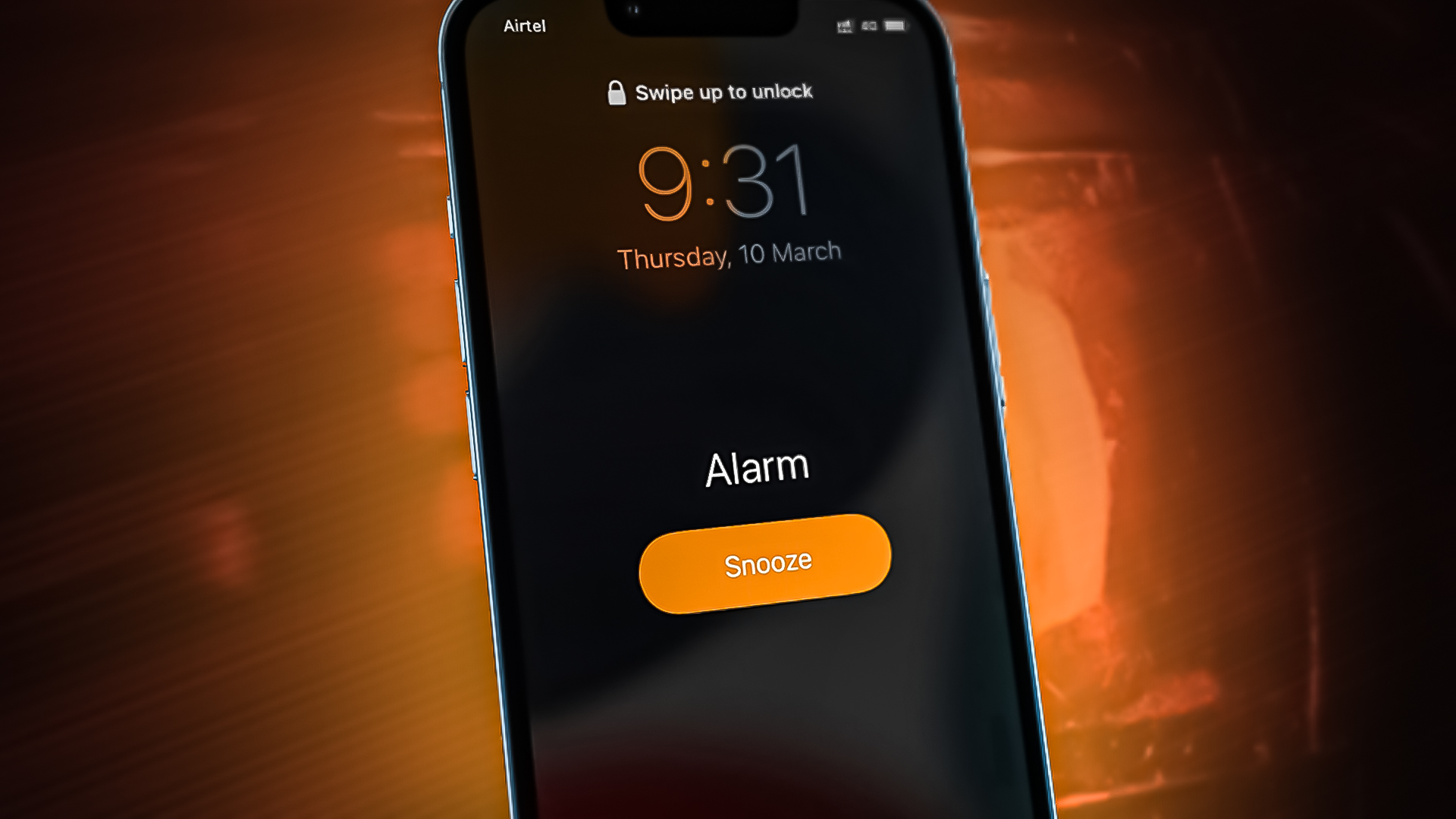
This problem is called a silent alarm problem. This can be quite problematic as there are reports where people failed to catch a flight, or missed an important appointment.
| Issue | Alarms not ringing on iPhone |
| Caused by | Audio format not supported Conflicting settings Focus modes |
| Solutions | Restarting device Disabling conflicting modules Changing device settings |
1. Force Restart the iPhone
Before we move to other solutions, you should force restart your iPhone to rule out the bad cache.
- Quickly press & release the volume up button.
- Then quickly press & release the volume down button.
- Now press and hold the iPhone’s side button till the screen shows the Apple logo.
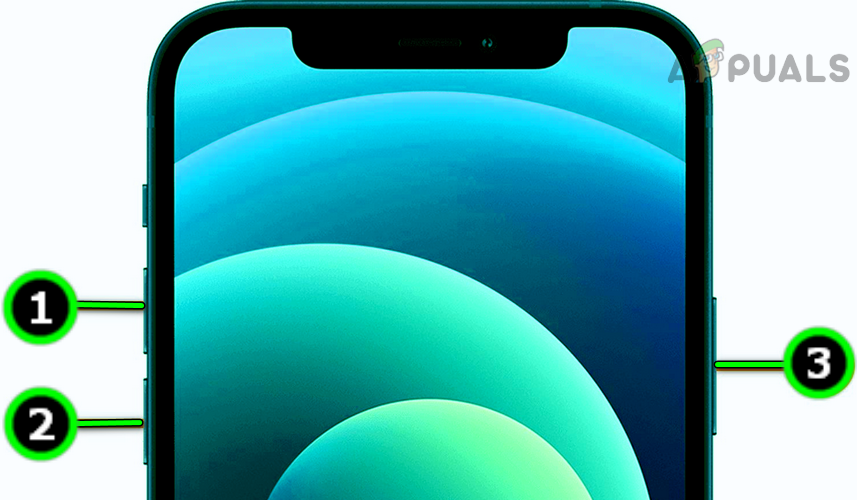
Force Restart the iPhone - Once the Apple logo is shown, release the side button.
If the issue was cleared but reoccurs after some time, make a habit of force restarting the iPhone daily just before going to sleep.
2. Disable the Attention Aware Feature
The attention Aware feature can silence your alarms if it detects your face. However, we have seen this feature malfunction when users are not looking at the screen. To further find the root cause of this issue, we suggest temporarily disabling this feature and testing the alarms.
- Open the Settings app on your iPhone.
- Now navigate to Face ID and Passcode.
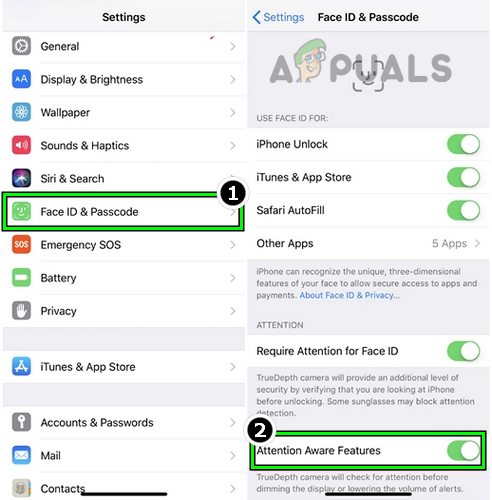
Disable the Attention Aware Feature of the iPhone - Here toggle off “Attention Aware Features“. Restart your device and see if the issue is resolved.
3. Delete and Recreate Alarms on the iPhone
Your existing alarms could be bugged and not trigger your iPhone’s ringer. In this case, you have to delete all the existing alarms and create new ones. This will overwrite the problematic alarms and can fix your issue.
- Launch the iPhone’s Clock app and swipe left on an alarm.
- Now tap on Delete. Repeat the same to delete all the existing alarms whether they are enabled or disabled.
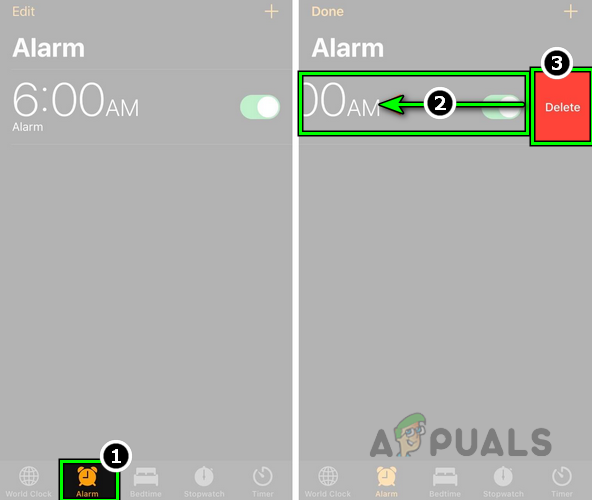
Delete An Alarm in the iPhone’s Clock App - Now restart your iPhone, and set up new alarms. Make sure you use the default configurations.
Set an alarm to test 2 minutes from your time. If it works well, you can change their configurations including Snooze and custom alarm tone.
4. Change the Alarm Tone
If your alarm on your iPhone isn’t going off, it could be because the ringtone file is damaged or not working properly. This issue is very common if you aren’t using the tones from the default library. Switch to a ringtone that comes pre-installed on your iPhone to fix this issue.
- Launch the Clock app on the iPhone and head to the Alarm tab.
- Now tap on Edit and select the problematic alarm.
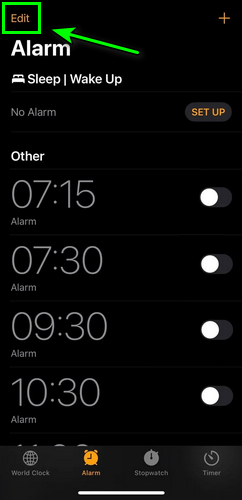
Edit an iPhone Alarm - Then tap on Sound and under Ringtone, select the default alarm sound like Radar (not a song or music track). If no ringer is heard, keep selecting different alarm sounds until you hear one.
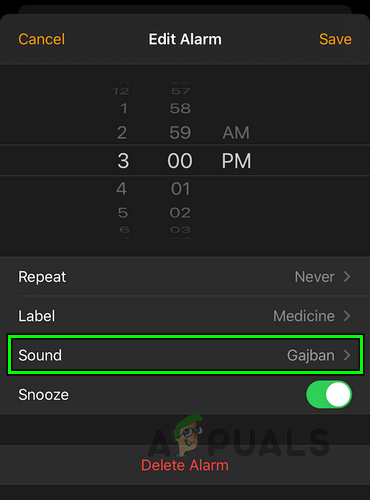
Open Sound in the Edit Alarm Settings of the iPhone - Now set the alarm volume to maximum and hit the back button after saving the changes.
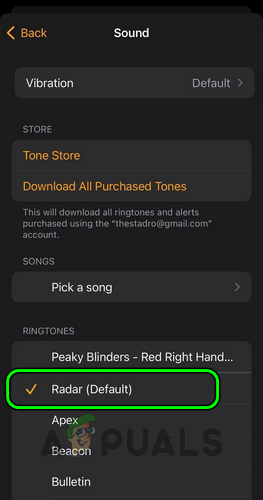
Set Radar as the Ringtone of the Alarm - Then make sure the selected sound is shown under Sound and afterward, check if the issue is resolved.
- If not, set the alarm’s tone as none and force restart the iPhone.
- Upon restart, set up another tone on the alarm, and then check if the alarm is working.
5. Edit the iPhone’s Sound Settings
The alarm on your iPhone will also not ring if the iPhone’s sound settings are not configured properly or are silent without you knowing it. In this scenario, editing the iPhone’s sound settings to the maximum will solve the problem.
- Open the Settings app.
- Navigate to “Sounds & Haptics”.
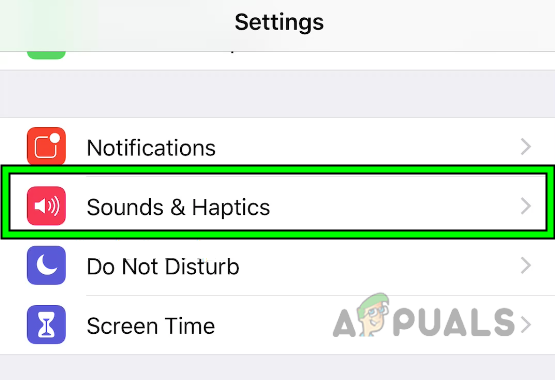
Open Sound & Haptics in the iPhone Settings - Set “Ringer and Alerts” to Maximum.
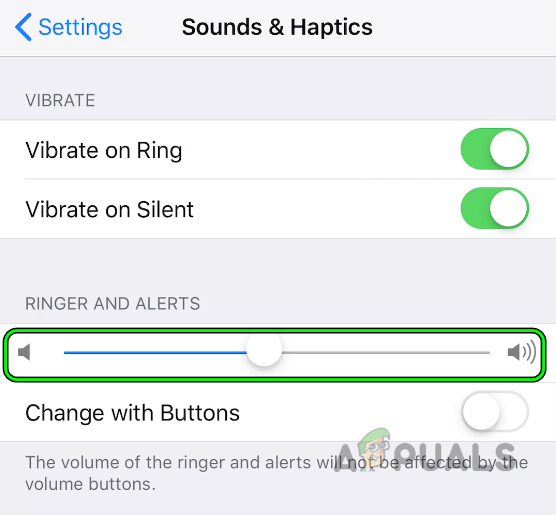
Set Ringer and Alerts Volume to Maximum in the iPhone Sound Settings - After restarting your device, check if the issue is resolved.
- If not, check if disabling Vibrate in the iPhone’s Ringers and Alerts settings clears the error.
If this doesn’t work, make sure the silent switch is toggled off. There is a silent mode switch on the side of your iPhone. Sometimes if that switch is toggled to enabled, then that will not let any alarm ring.
Even though this isn’t by design, we’ve still seen it happen in multiple cases. Here, disabling the iPhone’s silent switch will do the trick.
- Firstly, locate the silent mode switch on the side of your iPhone and then disable it.
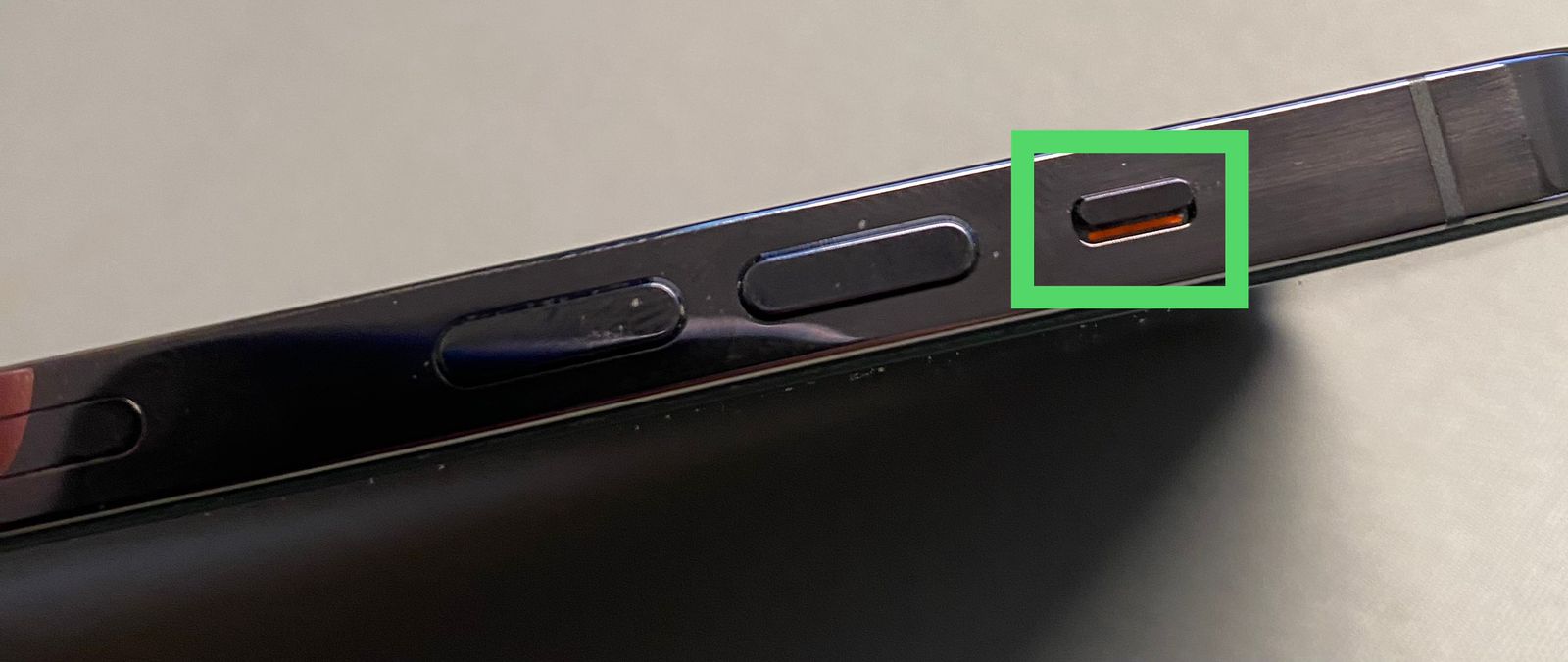
- Afterward, check if the alarm issue is resolved.
- If the switch is already disabled, check if enabling/disabling it clears the problem.
6. Download the Music Track to the iPhone in High Quality
Lossless audio format is not supported to be used as alarm ringers in iPhone. If you’re using a music track as an alarm tune, then it will not ring at all. Here, we can change Music settings to make sure this format is not set by default by the operating system.
- Open iPhone’s Settings app.
- Now head over to Music > Dolby Atmos > Set to Off.
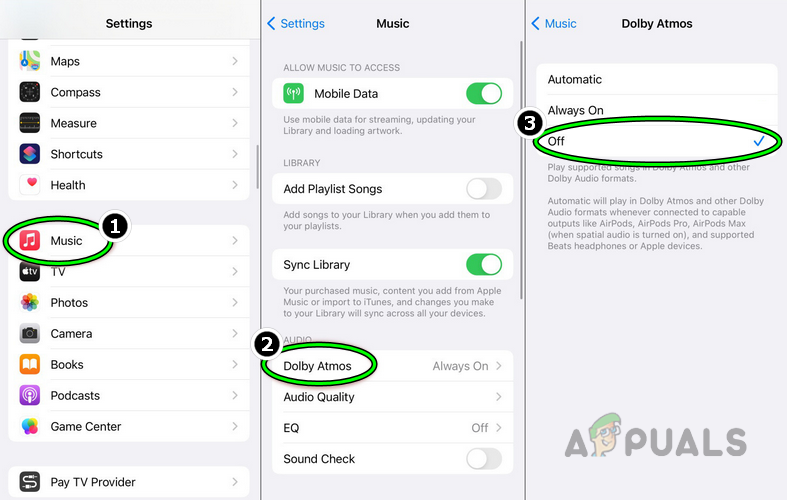
Disable Dolby Atmos in the iPhone Music Settings - Press back and now navigate to “Audio Quality” and Toggle it off.
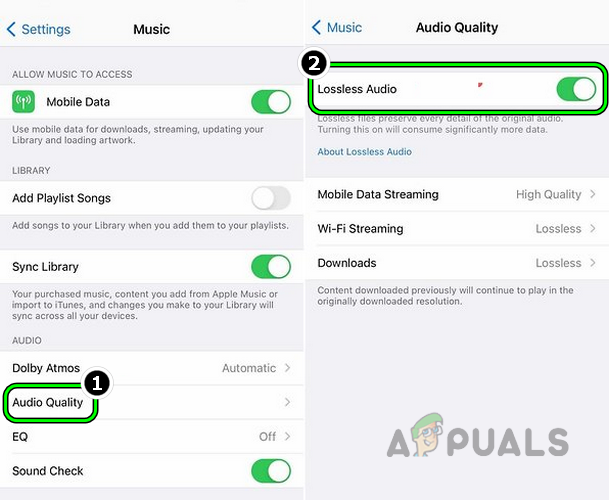
Disable Lossless Audio Quality in the iPhone’s Music Settings - Restart your iPhone and upon restart, download the songs and delete the alarms. You can tap on three vertical ellipses in the library and select Download to download them.
- Now recreate the alarms and then check if the issue is resolved.
- If that didn’t work, delete the song that you are trying to use as the alarm tone.
- Launch Music settings again.
- Open Audio Quality > Downloads and set it to High Quality.
- Download the song again that you want to use as the alarm tone.
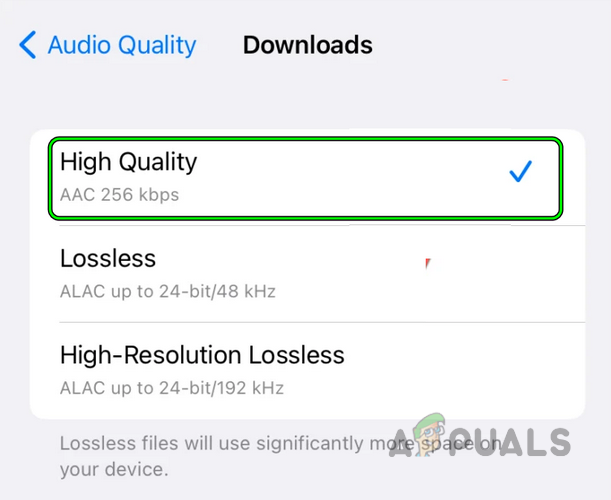
Set Audio Quality Download of the iPhone to High Quality - Navigate back to your Alarms and create a new one with the downloaded audio. Check if it works now.
7. Enable Snooze on Multiple Alarms
If you are a heavy sleeper and enable multiple alarms but the first alarm has a snooze & the others do not, then that could create conflicts. The first alarm’s snooze mechanism will override the other alarms that are scheduled later. This is a reported bug in iOS. In this case, enabling Snooze on multiple alarms will solve the problem.
- Launch the Clock App.
- Navigate to the Alarm tab and open the problematic alarm.
- Make sure it has Snooze enabled.
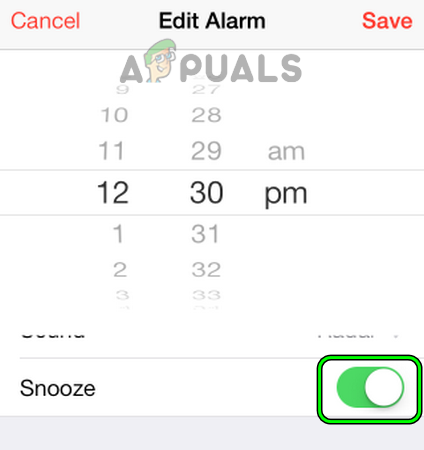
Enable Snooze on an iPhone Alarm - Then repeat the same for all other alarms and then check if the issue is resolved.
8. Disable “Change with Buttons” in Settings
If you have a habit of controlling the alarm’s volume through the buttons, then you may accidentally turn it down, which may make it seem like the alarm didn’t go off. In this case, disabling the “Change with Buttons” option in the iPhone’s Ringer and Alerts settings can remedy the problem.
- Open the Settings app.
- Navigate to Sounds & Haptics > Ringers & Alerts > Disable the ‘Change with Buttons‘.
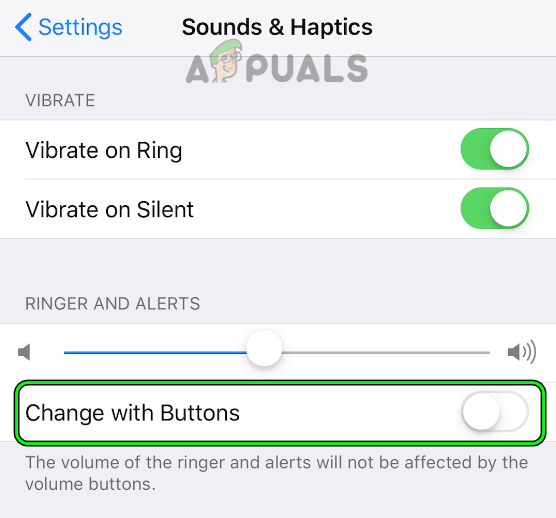
Disable the Change With Button in the Ringers and Alerts Section of the iPhone Settings - Then make sure the alert volume is set to 70% or above and afterward, check if the iPhone’s alarm goes off properly.
- If that did not work, check if disabling the Change with Buttons altogether fixes it.
9. Disable the Focus & Sleep Mode
In some cases, Do Not Disturb focus modes prevents alarms to go off at all. Even if they do, they will be in a lowered volume. In this scenario, we can disable the focus modes altogether.
- Launch the iPhone Settings.
- Navigate to Focus > Disable the setting.
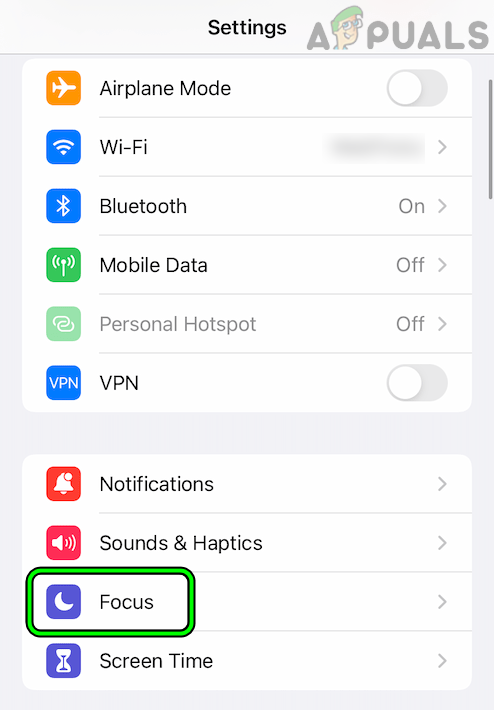
Open Focus in the iPhone Settings - Also, make sure it is not set to be enabled automatically. Repeat the same for all other Focus modes including Sleep.
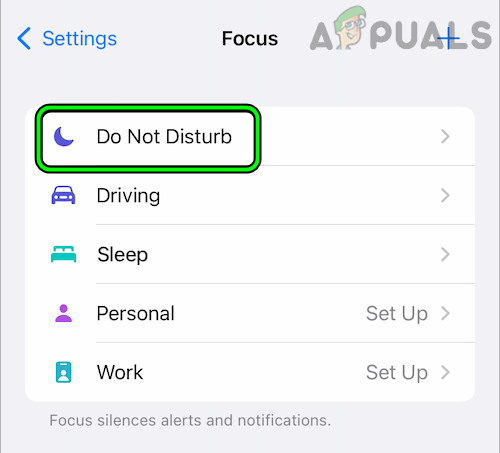
Open Do not Disturb in the Focus Settings of the iPhone - Once finished, check if the iPhone’s alarm goes off properly. If you must enable Focus Mode in the future, make sure that alarms are allowed to operate while in that mode.
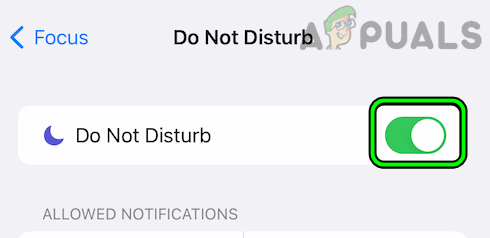
Disable Do Not Disturb Mode in the iPhone’s Focus Settings - If the issue persists and if you are using a customized Focus mode, make sure you are using a standard ring tone and then check if the problem is solved.
If you have a proper sleep schedule in place, you can disable it for good to be sure it doesn’t get enabled again.
- Navigate to Sleep > Full Schedule & Options > Sleep Schedule. Disable this feature.
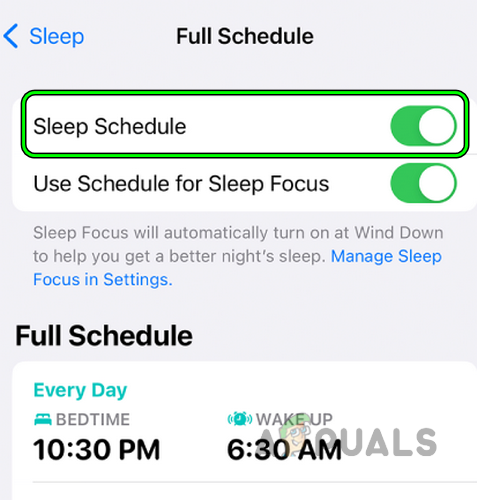
Disable Sleep Schedule on the iPhone - Now check if the iPhone’s alarm issue is resolved.
10. Disable Bluetooth on the iPhone
You will not hear an iPhone alarm going off if due to a glitch, the iPhone “thinks” there is a Bluetooth device like Airpods or Bluetooth speakers connected to the iPhone. The alarm will get directed to that device instead. Here, disabling the iPhone’s Bluetooth can do the trick.
- Launch the iPhone Settings.
- Open Bluetooth and disable the option
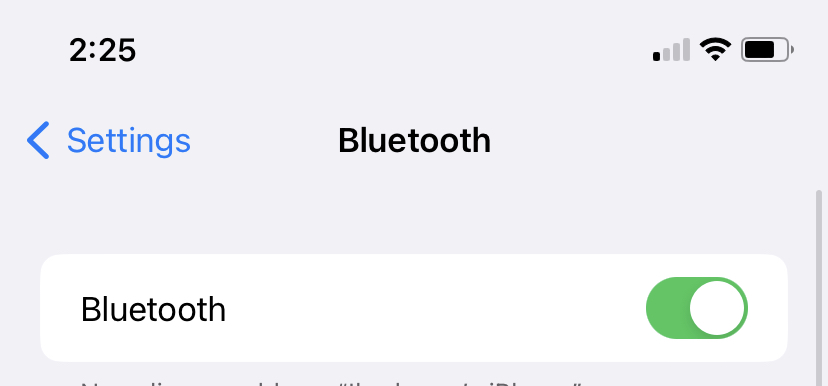
- Restart your phone and then check if the alarms are working.
- If that works but you want to use Bluetooth, head to the Bluetooth Settings of the iPhone and remove all the paired Bluetooth devices.
- Now pair your devices again from scratch. This will refresh their connection configurations and solve the problem.
11. Disable Notifications on the iPhone
An alarm will not ring on your iPhone if another notification is received at the same time as your alarm. Chances are very low but we’ve seen this happen. In this case, disabling iPhone notifications before going to sleep will resolve the issue.
- Firstly, try to identify the notifications that may pop up. These can also be Calendar notifications.
- Navigate to iPhone Settings > Notifications.
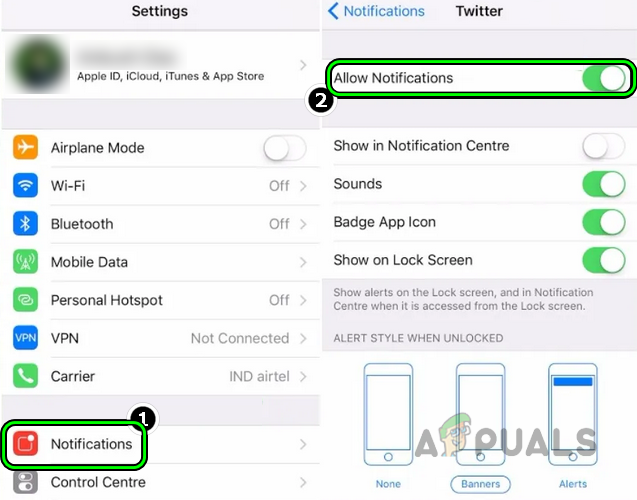
Disable iPhone Notifications - Then disable the notifications that you think are popping up. If you cannot figure out which ones, you can disable all of them temporarily.
- Restart your device and see if the issue is fixed.
12. Resetting All Settings
If none of the above methods works, you can attempt resetting all your settings before we move on to factory resetting your entire iPhone. Do not forget to note down/back up the info like Wi-Fi credentials that you will require later.
- Launch the iPhone Settings
- Navigate to General > Reset > Reset all settings.
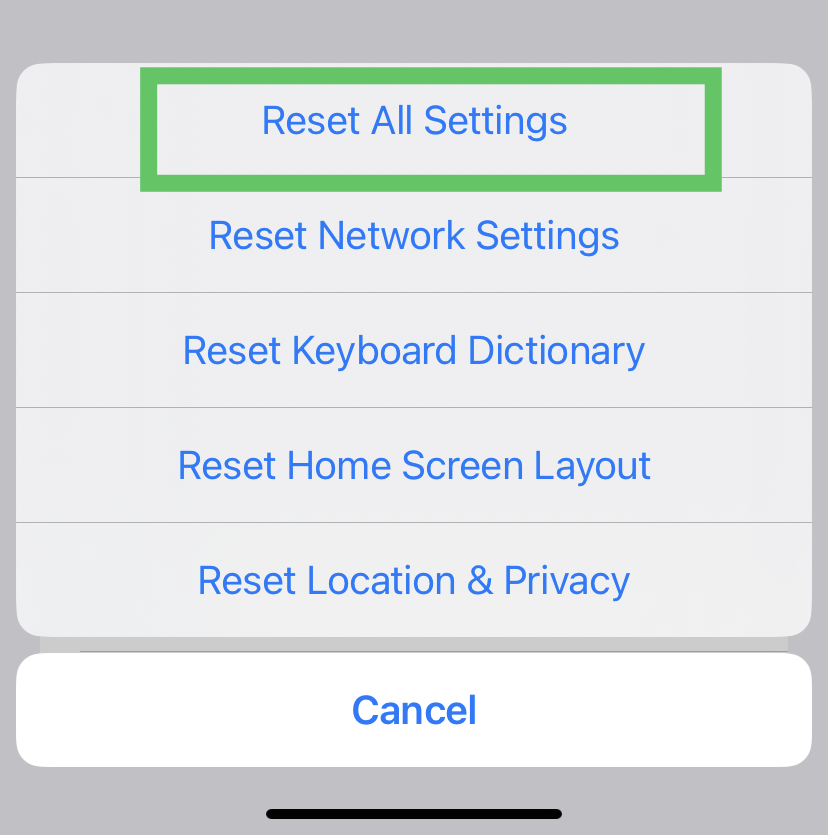
Resetting all settings on iPhone - Then, if asked to, enter the iPhone’s passcode to initiate the reset process and afterward, wait till the process completes.
- Once done, check if the iPhone’s alarm issue is resolved.
14. Reset the iPhone to the Factory Defaults
If you’re reading this far down and nothing worked at this point, we can move ahead and factory reset your entire phone. This is more of a guaranteed fix. Before moving on, charge the phone’s battery to full, and do not forget to create a backup of the iPhone.
- Launch the iPhone’s Settings
- Navigate to General > Reset > Erase all content & settings.
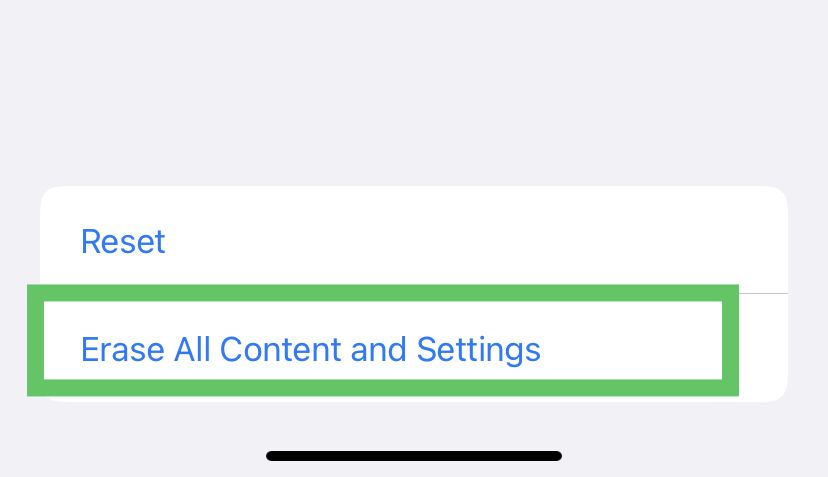
Erasing all content & settings on iPhone - Enter your iPhone’s passcode if applicable and reset your device.
- Now, wait till the process is complete. Once done, set up the iPhone as a new device.
- Then set up an alarm on the iPhone and hopefully, it will be working fine. You can then recover the backed-up data.





